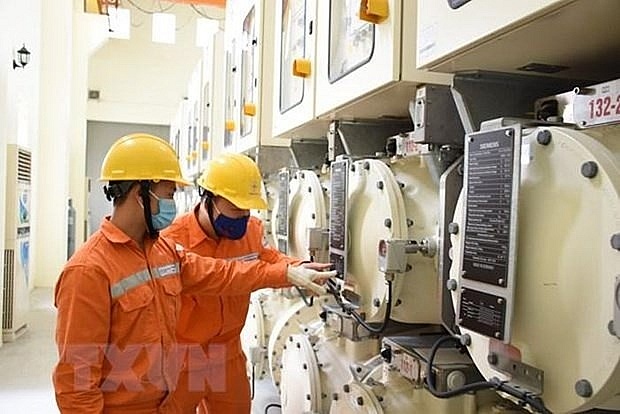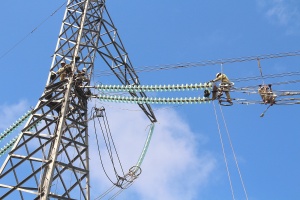Enterprises wary over EVN proposal
The state-run group (EVN) has proposed increasing electricity prices after incurring a loss of more than $1.35 billion this year due to soaring input costs.
 |
| Enterprises wary over EVN proposal, Illustrative image (Photo: VNA) |
EVN claimed that the cost of fuel for electricity production, such as coal, oil, and gas, had increased by 3-5 times, causing production and purchasing costs to skyrocket.
The corporation continues facing issues balancing cash flow to pay for electricity purchase costs and mobilising capital to invest in projects, affecting its business results in 2023 and the coming years.
In calculations in the middle of the year, the average retail price of electricity in 2022 reached 8.3 US cents per kWh, 2.74 per cent higher than the average retail price of electricity applied since 2019.
Nguyen Quang Cung, chairman of the Vietnam Cement Association, talked of the challenges when it comes to EVN’s proposal to increase the electricity prices.
“In reality, without this proposal, cement manufacturers have undergone a period of hardship due to soaring input costs, especially coal prices, which account for 60 per cent of production fee. Meanwhile, the output faces challenges due to the decrease in purchasing power,” Cung said.
“We understand that EVN is in force majeure because they face our same challenge relating to the input cost burden. However, it cannot be denied that if the proposal is approved, cement manufacturers will wreak business havoc because many companies are suffering losses and have suspended the operations of many production lines,” Cung added.
According to VNDirect, Vietnam’s cement industry is in a state of both surplus and shortage, with the current domestic cement demand sitting at fewer than 65 million tonnes. Meanwhile, the industry’s capacity scale has reached nearly 107 million tonnes.
Experts pointed out that exports to China have dipped due to its pandemic policies. In addition, its real estate market is declining, leading to a plummet in cement consumption. Vietnam’s second-largest cement export market, the Philippines, is also affected by complex shipping and high freight rates.
The head of the union of a foreign-invested company with over 35,000 workers told VIR that the adjustment in electricity price will impact both businesses in the garment and textile and their employees.
“Many companies are requiring their employees to work on reduced shifts because a decline in orders has slowed production. The decline in orders will impact the revenue and profit. Meanwhile, we still have to ensure stable income to retain employees to overcome this difficult period; otherwise they will move to their hometowns or look for other jobs,” he said.
“Regarding employees, they will face problems because when the power prices are adjusted, they will have to pay more for bills, simultaneously the cost for renting houses, foods, and petrol will also escalate,” the head added. “In normal times when input costs increase, businesses will adjust the selling prices of products to balance the profit. However, at this time, increasing product prices is impossible.”
Pham Van Viet, general director of Viet Thang Jeans, told local media that each of the company’s facilities spend an average of VND800 million ($34,700) for power consumption per month. The company currently has 3,200 employees. With that, foreign-invested companies in garments, textiles and footwear at a scale of over 30,000 employees, like Taekwang Vina or Changshin, have to pay hundreds of thousands of US dollars per month more for power bills.
Textiles, garments, and footwear suffer the most energy consumption, along with transportation and residential areas. Commercial and public services, as well as agriculture and forestry, only account for a subordinate share.
| The Ministry of Industry and Trade (MoIT) is drafting a decision on the mechanism for adjusting the average retail electricity price. Under the draft, when the input parameters fluctuate, causing the average retail price of electricity to decrease compared to the current average retail price, EVN is responsible for reducing the average retail price of electricity at the corresponding rate, but not lower than the minimum price of the price bracket. It would also reduce the retail price of electricity for each group of electricity users in accordance with current regulations on the structure of the electricity retail tariff. After the reduction, EVN is responsible for making a report to the MoIT, the Ministry of Finance, and the State Capital Investment Corporation for inspection and supervision. |
 | EVN makes request to raise power price Electricity of Vietnam has proposed increasing electricity prices after losing more than $1.35 billion this year due to soaring input costs. |
What the stars mean:
★ Poor ★ ★ Promising ★★★ Good ★★★★ Very good ★★★★★ Exceptional
Related Contents
Latest News
More News
- Masan Consumer names new deputy CEO to drive foods and beverages growth (February 23, 2026 | 20:52)
- Myriad risks ahead, but ones Vietnam can confront (February 20, 2026 | 15:02)
- Vietnam making the leap into AI and semiconductors (February 20, 2026 | 09:37)
- Funding must be activated for semiconductor success (February 20, 2026 | 09:20)
- Resilience as new benchmark for smarter infrastructure (February 19, 2026 | 20:35)
- A golden time to shine within ASEAN (February 19, 2026 | 20:22)
- Vietnam’s pivotal year for advancing sustainability (February 19, 2026 | 08:44)
- Strengthening the core role of industry and trade (February 19, 2026 | 08:35)
- Future orientations for healthcare improvements (February 19, 2026 | 08:29)
- Infrastructure orientations suitable for a new chapter (February 19, 2026 | 08:15)

 Tag:
Tag:



















 Mobile Version
Mobile Version